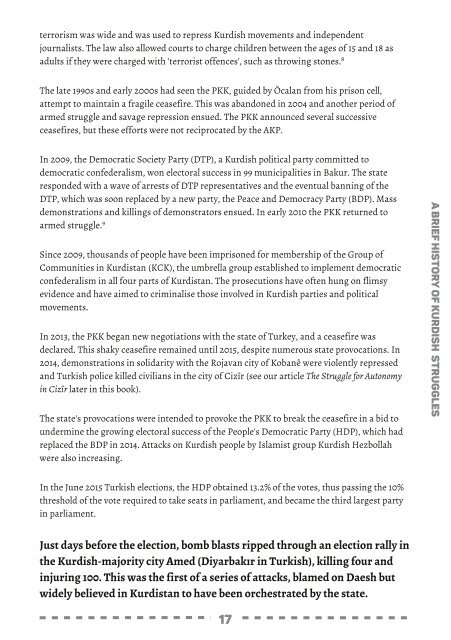STRUGGLES
Struggles-for-autonomy-in-Kurdistan
Struggles-for-autonomy-in-Kurdistan
You also want an ePaper? Increase the reach of your titles
YUMPU automatically turns print PDFs into web optimized ePapers that Google loves.
terrorism was wide and was used to repress Kurdish movements and independent<br />
journalists. The law also allowed courts to charge children between the ages of15 and 18 as<br />
adults ifthey were charged with 'terrorist offences', such as throwing stones. 8<br />
The late 1990s and early 2000s had seen the PKK, guided by Öcalan from his prison cell,<br />
attempt to maintain a fragile ceasefire. This was abandoned in 2004 and another period of<br />
armed struggle and savage repression ensued. The PKK announced several successive<br />
ceasefires, but these efforts were not reciprocated by the AKP.<br />
In 2009, the Democratic Society Party (DTP), a Kurdish political party committed to<br />
democratic confederalism, won electoral success in 99 municipalities in Bakur. The state<br />
responded with a wave ofarrests ofDTP representatives and the eventual banning ofthe<br />
DTP, which was soon replaced by a new party, the Peace and Democracy Party (BDP). Mass<br />
demonstrations and killings ofdemonstrators ensued. In early 2010 the PKK returned to<br />
armed struggle. 9<br />
Since 2009, thousands ofpeople have been imprisoned for membership ofthe Group of<br />
Communities in Kurdistan (KCK), the umbrella group established to implement democratic<br />
confederalism in all four parts ofKurdistan. The prosecutions have often hung on flimsy<br />
evidence and have aimed to criminalise those involved in Kurdish parties and political<br />
movements.<br />
In 2013, the PKK began new negotiations with the state ofTurkey, and a ceasefire was<br />
declared. This shaky ceasefire remained until 2015, despite numerous state provocations. In<br />
2014, demonstrations in solidarity with the Rojavan city ofKobanê were violently repressed<br />
and Turkish police killed civilians in the city ofCizîr (see our article The Struggle for Autonomy<br />
in Cizîr later in this book).<br />
The state's provocations were intended to provoke the PKK to break the ceasefire in a bid to<br />
undermine the growing electoral success ofthe People's Democratic Party (HDP), which had<br />
replaced the BDP in 2014. Attacks on Kurdish people by Islamist group Kurdish Hezbollah<br />
were also increasing.<br />
a brief historyof kurdish struggles<br />
In the June 2015 Turkish elections, the HDP obtained 13.2% ofthe votes, thus passing the 10%<br />
threshold ofthe vote required to take seats in parliament, and became the third largest party<br />
in parliament.<br />
Just days before the election, bomb blasts ripped through an election rally in<br />
the Kurdish-majority city Amed (Diyarbakır in Turkish), killing four and<br />
injuring 100. This was the first ofa series ofattacks, blamed on Daesh but<br />
widely believed in Kurdistan to have been orchestrated by the state.<br />
17


